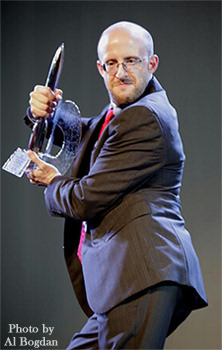 Here’s a counterpoint to all those AuthorEarnings reports on the self-publishing scene. U.S. fantasy author Jim C. Hines has posted an annual item on his blog detailing his income for the past year, and its sources. And, he says, “I’m happy to say that 2015 was my best year yet.” Why and how? Now read on…
Here’s a counterpoint to all those AuthorEarnings reports on the self-publishing scene. U.S. fantasy author Jim C. Hines has posted an annual item on his blog detailing his income for the past year, and its sources. And, he says, “I’m happy to say that 2015 was my best year yet.” Why and how? Now read on…
Hines says of himself that “I’ve self-published a few things, but I’m primarily “traditionally published’.” I’ve kept his quote marks in this title, partly out of deference to him, but also because I don’t want to encourage any trad-versus-selfie grudge match faceoff between the two modes of publishing, especially in the case of how a single author chooses to publish. For authors, the two modes are complementary, not conflicting, in my opinion. (The commercial interests of big publishing houses, and their power position versus authors, is a different matter.)
Hines declares that, “before taxes and expenses (but after my agent’s commission), writing brought in $61,756.93.” He then proceeds to break this down by sources, noting that “I didn’t sign any new book deals last year, but I did have two new books come out.” Of that income, he attributes 81 percent to U.S. novels, 12 percent to non-U.S. editions of his novels, 6 percent to self-published work, 1 percent to short fiction and other writing, and zero from other writing-related sources. Hines also notes that “I’ve never hit the NYT or USA Today bestseller lists, but my last three books have been lead titles for my publisher. For most of 2015, I had a full-time job as a state employee, meaning I was not working full-time as a writer.”
Obviously, even with the buffer of a day job, Hines has made a pretty respectable income from his writing during 2015. Some significant takeaways from his breakdown follow. There are no film or other media rights factored in to that income – it’s all simply straight income from published writing. The total is after the agent’s commission, suggesting that agents really are worth their percentage – after all, who knows what the final total would be like without their help? There’s precious little contribution from foreign rights sales, even though Hines is working in a genre that travels pretty well, but as Hines himself admits in the comments section, much foreign English-language income may be lumped in to the U.S. portion. There’s little to no serial publishing or journalism in the equation. Oh, and then there’s that self-publishing item …
“The self-publishing slice of the pie is more than double what it was last year,” remarks Hines. “This is primarily thanks to Rise of the Spider Goddess, which I self-pubbed at the end of 2014.” Consequently, even though self-published work brought in only $3368 of his total take for 2015, Hines says, ” I want to delve more into the self-publishing side of things.” And he speaks approvingly of other fantasy writers who have made even more out of their self-published efforts.
So, based on that breakdown, there’s no compelling financial case for a writer in Hines’s position to ditch traditional publishing and go entirely self-published. On the other hand, that’s from the point of view of an established author “with eleven books in print from a major New York publisher [DAW].” But Hines apparently doesn’t have any bone to pick with self-publishing versus trad pub, and is happy to explore doing it himself. And, most reassuringly of all, it is still possible to make a decent living from traditional publishing, even without hitting the bestseller lists. Comfort for some at the start of 2016, I’m sure.

































